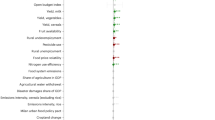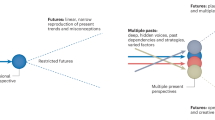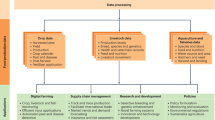Abstract
Despite the growing knowledge that food system solutions should account for interactions and drivers across scales, broader societal debate on how to solve food system challenges is often focused on two dichotomous perspectives and associated solutions: either more localized food systems or greater global coordination of food systems. The debate has found problematic expressions in contemporary challenges, prompting us to revisit the role that resilience thinking can play when faced with complex crises that increase uncertainty. Here we identify four ‘aching points’ facing food systems that are central points of tension in the local–global debate. We apply the seven principles of resilience to these aching points to reframe the solution space to one that embeds resilience into food systems’ management and governance at all scales, supporting transformative change towards sustainable food systems.
This is a preview of subscription content, access via your institution
Access options
Access Nature and 54 other Nature Portfolio journals
Get Nature+, our best-value online-access subscription
$32.99 / 30 days
cancel any time
Subscribe to this journal
Receive 12 digital issues and online access to articles
$119.00 per year
only $9.92 per issue
Buy this article
- Purchase on SpringerLink
- Instant access to full article PDF
Prices may be subject to local taxes which are calculated during checkout

Similar content being viewed by others
References
McNeill, J. R. Something New under the Sun: An Environmental History of the Twentieth-Century World (the Global Century Series) (WW Norton & Company, 2001).
Born, B. & Purcell, M. Avoiding the local trap: scale and food systems in planning research. J. Plan. Educ. Res. 26, 195–207 (2006).
Enthoven, L. & van den Broeck, G. Local food systems: reviewing two decades of research. Agric. Syst. 193, 103226 (2021).
Zerbe, N. Moving from bread and water to milk and honey: framing the emergent alternative food systems. Humboldt J. Soc. Relat. 33, 4–29 (2010).
Tregear, A. Progressing knowledge in alternative and local food networks: critical reflections and a research agenda. J. Rural Stud. 27, 419–430 (2011).
Deutsch, L. & Folke, C. Ecosystem subsidies to Swedish food consumption from 1962 to 1994. Ecosystems 8, 512–528 (2005).
Kreidenweis, U., Lautenbach, S. & Koellner, T. Regional or global? The question of low-emission food sourcing addressed with spatial optimization modelling. Environ. Model. Softw. 82, 128–141 (2016).
Sundkvist, Å., Milestad, R. & Jansson, A. On the importance of tightening feedback loops for sustainable development of food systems. Food Policy 30, 224–239 (2005).
Biggs, R., Schlüter, M. & Schoon, M. L. Principles for Building Resilience: Sustaining Ecosystem Services in Social-Ecological Systems (Cambridge Univ. Press, 2015).
Willett, W. et al. Food in the Anthropocene: the EAT-Lancet Commission on healthy diets from sustainable food systems. Lancet 393, 447–492 (2019).
Micha, R. et al. 2020 Global Nutrition Report: Action on Equity to End Malnutrition (Global Nutrition Report, 2020); https://go.nature.com/39YM5FR
Zhu, C. et al. Carbon dioxide (CO2) levels this century will alter the protein, micronutrients, and vitamin content of rice grains with potential health consequences for the poorest rice-dependent countries. Sci. Adv. 4, eaaq1012 (2018).
Abson, D. J. in Agroecosystem Diversity (eds Lemaire, G. et al.) 301–315 (Elsevier, 2019).
Kronberg, S. L. & Ryschawy, J. in Agroecosystem Diversity (eds Lemaire, G. et al.) 75–90 (Elsevier, 2019).
Biodiversity and Nutrition, A Common Path (FAO, 2009); https://go.nature.com/3HXOPER
Akinola, R., Pereira, L. M., Mabhaudhi, T., de Bruin, F.-M. & Rusch, L. A review of indigenous food crops in Africa and the implications for more sustainable and healthy food systems. Sustainability 12, 3493 (2020).
Godfray, H. C. J. et al. Food security: the challenge of feeding 9 billion people. Science 327, 812–818 (2010).
Oki, T. & Kanae, S. Global hydrological cycles and world water resources. Science 313, 1068–1072 (2006).
Tilman, D. et al. Future threats to biodiversity and pathways to their prevention. Nature 546, 73–81 (2017).
Khoury, C. K. et al. Increasing homogeneity in global food supplies and the implications for food security. Proc. Natl Acad. Sci. USA 111, 4001–4006 (2014).
Magurran, A. E. & McGill, B. J. Biological Diversity: Frontiers in Measurement and Assessment (Oxford Univ. Press, 2011).
Ellis, F. Rural Livelihoods and Diversity in Developing Countries (Oxford Univ. Press, 2000).
Haider, L. J., Boonstra, W. J., Akobirshoeva, A. & Schlüter, M. Effects of development interventions on biocultural diversity: a case study from the Pamir Mountains. Agric. Human Values 37, 683–697 (2020).
Österblom, H., Jouffray, J.-B., Folke, C. & Rockström, J. Emergence of a global science–business initiative for ocean stewardship. Proc. Natl Acad. Sci. USA 114, 9038–9043 (2017).
Queiroz, C. et al. Investment in resilient food systems in the most vulnerable and fragile regions is critical. Nat. Food 2, 546–551 (2021).
FAO, IFAD, UNICEF, WFP & WHO. The State of Food Security and Nutrition in the World 2022. Repurposing Food and Agricultural Policies to Make Healthy Diets More Affordable (FAO, 2022).
Suweis, S., Carr, J. A., Maritan, A., Rinaldo, A. & D’Odorico, P. Resilience and reactivity of global food security. Proc. Natl Acad. Sci. USA 112, 6902–6907 (2015).
Alandia, G., Rodriguez, J. P., Jacobsen, S.-E., Bazile, D. & Condori, B. Global expansion of quinoa and challenges for the Andean region. Glob. Food Sec. 26, 100429 (2020).
Okello, J. J., Narrod, C. A. & Roy, D. Export standards, market institutions and smallholder farmer exclusion from fresh export vegetable high value chains: experiences from Ethiopia, Kenya and Zambia. J. Agric. Sci. 3, 188 (2011).
OECD (ed.) in Global Food Security: Challenges for the Food and Agricultural System Ch. 3 (OECD, 2013).
Kinnunen, P. et al. Local food crop production can fulfil demand for less than one-third of the population. Nat. Food 1, 229–237 (2020).
Wood, S. A., Smith, M. R., Fanzo, J., Remans, R. & DeFries, R. S. Trade and the equitability of global food nutrient distribution. Nat. Sustain. 1, 34–37 (2018).
Gillson, I. & Fouad, A. Trade Policy and Food Security: Improving Access to Food in Developing Countries in the Wake of High World Prices (World Bank, 2015); https://openknowledge.worldbank.org/handle/10986/20537
Kummu, M. et al. Interplay of trade and food system resilience: gains on supply diversity over time at the cost of trade independency. Glob. Food Sec. 24, 100360 (2020).
Béné, C., Lawton, R. & Allison, E. H. “Trade matters in the fight against poverty”: narratives, perceptions, and (lack of) evidence in the case of fish trade in Africa. World Dev. 38, 933–954 (2010).
Béné, C. Resilience of local food systems and links to food security–a review of some important concepts in the context of COVID-19 and other shocks. Food Secur. 12, 805–822 (2020).
McCorriston, S. et al. What is the Evidence of the Impact of Agricultural Trade Liberalisation on Food Security in Developing Countries? (EPPI Centre, Univ. London, 2013).
Tu, C., Suweis, S. & D’Odorico, P. Impact of globalization on the resilience and sustainability of natural resources. Nat. Sustain. 2, 283–289 (2019).
Clapp, J. & Scott, C. The global environmental politics of food. Global Environ. Polit. 18, 1–11 (2018).
Bornemann, B. & Weiland, S. Empowering people—democratising the food system? Exploring the democratic potential of food-related empowerment forms. Politics Gov. 7, 105–118 (2019).
Larimore, S. & Schmutz, V. in A Place-Based Perspective of Food in Society (eds Fitzpatrick, K. & Willis, D.) Ch. 8 (Palgrave Macmillan, 2015).
Maya-Ambía, C. J. in A Place-Based Perspective of Food in Society (eds Fitzpatrick, K. & Willis, D.) Ch. 2 (Palgrave Macmillan, 2015).
Fuchs, D. & Clapp, J. (eds) in Corporate Power and Global Agrifood Governance Ch. 10 (MIT Press, 2009).
von Braun, J. & Birner, R. Designing global governance for agricultural development and food and nutrition security. Rev. Dev. Econ. 21, 265–284 (2017).
Boonstra, W. J. Conceptualizing power to study social-ecological interactions. Ecol. Soc. 21, 21 (2016).
Hawkes, C. Enhancing Coherence between Trade Policy and Nutrition Action (United Nations System Standing Committee on Nutrition, 2015); https://go.nature.com/3WC8heq
Estêvão, J. A. A florestação dos baldios [Portuguese]. Anal. Soc. 19, 1157–1260 (1983).
Borras, S. M. Jr, Franco, J. C., Gómez, S., Kay, C. & Spoor, M. Land grabbing in Latin America and the Caribbean. J. Peasant Stud. 39, 845–872 (2012).
Palumbo, R. et al. Unravelling the food literacy puzzle: evidence from Italy. Food Policy 83, 104–115 (2019).
Crona, B. I. et al. Masked, diluted and drowned out: how global seafood trade weakens signals from marine ecosystems. Fish Fish. 17, 1175–1182 (2016).
Hinrichs, C. Fixing food with ideas of “local” and “place”. J. Environ. Stud. Sci. 6, 759–764 (2016).
Gordon, L. J. et al. Rewiring food systems to enhance human health and biosphere stewardship. Environ. Res. Lett. 12, 100201 (2017).
Weis, A. J. & Weis, T. The Global Food Economy: The Battle for the Future of Farming (Zed Books, 2007).
Pollan, M. In Defense of Food: An Eater’s Manifesto (Penguin Press, 2008).
Gardner, T. A. et al. Transparency and sustainability in global commodity supply chains. World Dev. 121, 163–177 (2019).
Future of Food: Harnessing Digital Technologies to Improve Food System Outcomes (World Bank, 2019).
Astill, J. et al. Transparency in food supply chains: a review of enabling technology solutions. Trends Food Sci. Technol. 91, 240–247 (2019).
Deutsch, L. et al. Urbanization, Biodiversity and Ecosystem Services: Challenges and Opportunities 505–537 (Springer, 2013).
Seitzinger, S. P. et al. Planetary stewardship in an urbanizing world: beyond city limits. Ambio 41, 787–794 (2012).
Biggs, R. et al. Toward principles for enhancing the resilience of ecosystem services. Annu. Rev. Environ. Resour. 37, 421–448 (2012).
Loconto, A. & Hatanaka, M. Participatory guarantee systems: alternative ways of defining, measuring, and assessing ‘sustainability’. Sociol. Ruralis 58, 412–432 (2018).
Stoll, J. S., Bailey, M. & Jonell, M. Alternative pathways to sustainable seafood. Conserv. Lett. 13, e12683 (2020).
The Journey to Sustainable Food: A Three-year Update on the Behind the Brands Campaign (Oxfam, 2016); https://go.nature.com/3Wx0Ftx
Boucher, B. A., Manafò, E., Boddy, M. R., Roblin, L. & Truscott, R. The Ontario Food and Nutrition Strategy: identifying indicators of food access and food literacy for early monitoring of the food environment. Health Promot. Chronic Dis. Prev. Can. 37, 313–319 (2017).
Lang, T. & Mason, P. in Sustainable Diets: Linking Nutrition and Food Systems (eds Burlingame, B. & Dernini, S.) (CAB International, 2019).
Craigie, A. M., Lake, A. A., Kelly, S. A., Adamson, A. J. & Mathers, J. C. Tracking of obesity-related behaviours from childhood to adulthood: a systematic review. Maturitas 70, 266–284 (2011).
FAO, IFAD, UNICEF, WFP & WHO. The State of Food Security and Nutrition in the World 2021. Transforming Food Systems for Food Security, Improved Nutrition and Affordable Healthy Diets for All (FAO, 2021).
Moseley, W. G. & Battersby, J. The vulnerability and resilience of African food systems, food security, and nutrition in the context of the COVID-19 pandemic. Afr. Stud. Rev. 63, 449–461 (2020).
Zollet, S. et al. Towards territorially embedded, equitable and resilient food systems? Insights from grassroots responses to COVID-19 in Italy and the city region of Rome. Sustainability 13, 2425 (2021).
Fennell, S. Local food solutions during the coronavirus crisis could have lasting benefits. Univ. Cambridge; https://www.cam.ac.uk/stories/globaltolocal
Chakrabarti, S. Keep trade flowing. Nutrition Connect (1 June 2020); https://go.nature.com/3jgQIC6
Brenton, P., Ferrantino, M. J. & Maliszewska, M. Reshaping Global Value Chains in Light of COVID-19: Implications for Trade and Poverty Reduction in Developing Countries (World Bank Publications, 2022).
Ukraine: Note on the Impact of the War on Food Security In Ukraine (FAO, 2022).
Information Note: The Importance of Ukraine and the Russian Federation for Global Agricultural Markets and the Risks Associated with the War In Ukraine (FAO, 2022).
Eklund, M. Egen produktion är nyckeln till minskad sårbarhet i kris (own production is the key to reduced vulnerability in a crisis) [Swedish]. Linköping Univ. (16 March 2022); https://go.nature.com/3HNsA4i
Lee, M. Ukraine conflict prompts countries to hoard grain, endangering global food supply. Politico (2022); https://go.nature.com/3BNDq6j
ben Hassen, T. & el Bilali, H. Impacts of the Russia–Ukraine war on global food security: towards more sustainable and resilient food systems? Foods 11, 2301 (2022).
Laborde, D., Mamun, A. & Parent, M. COVID-19 Food Trade Policy Tracker (International Food Policy Research Institute, 2020); https://go.nature.com/3WbqXSe
War in Ukraine Drives Global Food Crises (World Food Programme, 2022); https://go.nature.com/3PLpGyR
Glauber, J. & Laborde, D. How will Russia’s invasion of Ukraine affect global food security? International Food Policy Research Institute (24 February 2022); https://go.nature.com/36UrhR4
Cottrell, R. S. et al. Food production shocks across land and sea. Nat. Sustain. 2, 130–137 (2019).
2022 Global Food Policy Report: Climate Change and Food Systems (International Food Policy Research Institute, 2022).
Tiensin, T. CSM Letter to the CFS Chair on the UN Food Systems Summit (CFS, 2021).
Canfield, M., Anderson, M. D. & McMichael, P. UN Food Systems Summit 2021: dismantling democracy and resetting corporate control of food systems. Front. Sustain. Food Syst. 5, 103 (2021).
Acknowledgements
The authors thank Azote for producing the conceptual figure. A.W. was partly supported by the Swedish Research Council FORMAS (grant no. 2019-01579). C.Q. was partly supported by the Swedish Marianne and Marcus Wallenberg Foundation (grant no. 2017.0137) and the FeedBaCks FORMAS/Era project (grant no. 1648401). L.D. was partly supported by the Swedish Research Council VR (grant no. 2018-02051). B.G.-M. was supported by the European Research Council (ERC) under the European Union’s Horizon 2020 research innovation programme (grant no. 682472—MUSES). M.J. was partly supported by the Mistra Food Futures programme (DIA 2018/24 8). L.P. was partly supported by the National Research Foundation of South Africa (grant no. 115300) and Swedish Research Council FORMAS (grant no. 2020-00670). E.W. was supported by the Erling-Persson Family Foundation. This work was partially funded by the IKEA Foundation, project number 31002610.
Author information
Authors and Affiliations
Contributions
A.W. and C.Q. developed the initial framework and led the writing and editing. L.D., B.G.-M., M.J., L.P., H.S., U.S. and E.W. contributed to the conceptual development, writing and editing of the manuscript. All co-authors approved the final version.
Corresponding author
Ethics declarations
Competing interests
The authors declare no competing interests.
Peer review
Peer review information
Nature Food thanks Tobias Plieninger, Christian Dorninger and the other, anonymous, reviewer(s) for their contribution to the peer review of this work.
Additional information
Publisher’s note Springer Nature remains neutral with regard to jurisdictional claims in published maps and institutional affiliations.
Rights and permissions
Springer Nature or its licensor (e.g. a society or other partner) holds exclusive rights to this article under a publishing agreement with the author(s) or other rightsholder(s); author self-archiving of the accepted manuscript version of this article is solely governed by the terms of such publishing agreement and applicable law.
About this article
Cite this article
Wood, A., Queiroz, C., Deutsch, L. et al. Reframing the local–global food systems debate through a resilience lens. Nat Food 4, 22–29 (2023). https://doi.org/10.1038/s43016-022-00662-0
Received:
Accepted:
Published:
Issue date:
DOI: https://doi.org/10.1038/s43016-022-00662-0
This article is cited by
-
Agrivoltaics as a climate-smart and resilient solution for midday depression in photosynthesis in dryland regions
npj Sustainable Agriculture (2025)
-
Market pathways to food systems transformation toward healthy and equitable diets through convergent innovation
Nature Communications (2025)
-
A mangrove metaphor for sustainable food systems centres diversification as the root of human and planetary health
Nature Food (2025)
-
Socio-techno-ecological transition dynamics in the re-territorialization of food production: the case of wild berries in Sweden
Sustainability Science (2025)
-
A new food security approach? Continuity and novelty in the European Union’s turn to preparedness
Agriculture and Human Values (2025)



